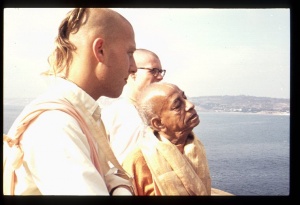CC Madhya 24.160: Difference between revisions
No edit summary |
(Vanibot #0054 edit - transform synonyms into clickable links, which search similar occurrences) |
||
| Line 19: | Line 19: | ||
<div class="synonyms"> | <div class="synonyms"> | ||
''yadā'' | ''[//vanipedia.org/wiki/Special:VaniSearch?s=yadā&tab=syno_o&ds=1 yadā]'' — when; ''[//vanipedia.org/wiki/Special:VaniSearch?s=hi&tab=syno_o&ds=1 hi]'' — certainly; ''[//vanipedia.org/wiki/Special:VaniSearch?s=na&tab=syno_o&ds=1 na]'' — not; ''[//vanipedia.org/wiki/Special:VaniSearch?s=indriya&tab=syno_o&ds=1 indriya]-[//vanipedia.org/wiki/Special:VaniSearch?s=artheṣu&tab=syno_o&ds=1 artheṣu]'' — sense gratification; ''[//vanipedia.org/wiki/Special:VaniSearch?s=na&tab=syno_o&ds=1 na]'' — not; ''[//vanipedia.org/wiki/Special:VaniSearch?s=karmasu&tab=syno_o&ds=1 karmasu]'' — in activities; ''[//vanipedia.org/wiki/Special:VaniSearch?s=anuṣajjate&tab=syno_o&ds=1 anuṣajjate]'' — one becomes engaged; ''[//vanipedia.org/wiki/Special:VaniSearch?s=sarva&tab=syno_o&ds=1 sarva]'' — all kinds of; ''[//vanipedia.org/wiki/Special:VaniSearch?s=saṅkalpa&tab=syno_o&ds=1 saṅkalpa]'' — desires; ''[//vanipedia.org/wiki/Special:VaniSearch?s=sannyāsī&tab=syno_o&ds=1 sannyāsī]'' — renouncing; ''[//vanipedia.org/wiki/Special:VaniSearch?s=yoga&tab=syno_o&ds=1 yoga]-[//vanipedia.org/wiki/Special:VaniSearch?s=ārūḍhaḥ&tab=syno_o&ds=1 ārūḍhaḥ]'' — one who has actually attained perfection in the ''yoga'' system; ''[//vanipedia.org/wiki/Special:VaniSearch?s=tadā&tab=syno_o&ds=1 tadā]'' — at that time; ''[//vanipedia.org/wiki/Special:VaniSearch?s=ucyate&tab=syno_o&ds=1 ucyate]'' — is said. | ||
</div> | </div> | ||
Latest revision as of 23:02, 19 February 2024
Śrī Caitanya-caritāmṛta - Madhya-līlā - Chapter 24: The Sixty-One Explanations of the Atmārāma Verse

His Divine Grace
A.C. Bhaktivedanta Swami Prabhupada
A.C. Bhaktivedanta Swami Prabhupada
TEXT 160
- yadā hi nendriyārtheṣu
- na karmasv anuṣajjate
- sarva-saṅkalpa-sannyāsī
- yogārūḍhas tadocyate
SYNONYMS
yadā — when; hi — certainly; na — not; indriya-artheṣu — sense gratification; na — not; karmasu — in activities; anuṣajjate — one becomes engaged; sarva — all kinds of; saṅkalpa — desires; sannyāsī — renouncing; yoga-ārūḍhaḥ — one who has actually attained perfection in the yoga system; tadā — at that time; ucyate — is said.
TRANSLATION
"'When a person is no longer interested in acting for sense gratification and when he renounces all material desires, he is said to be situated in perfect yoga [yogārūḍha].'